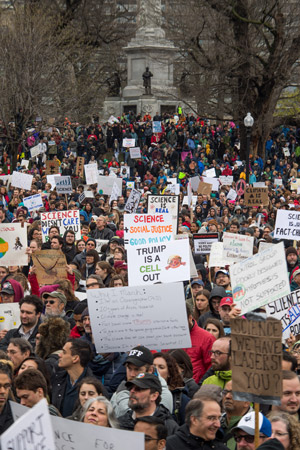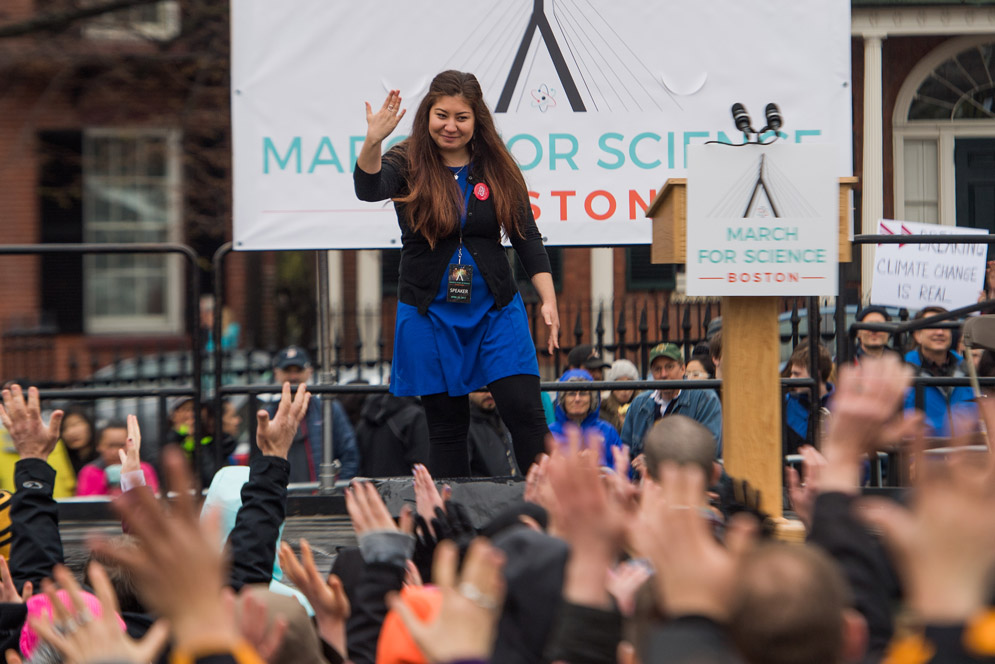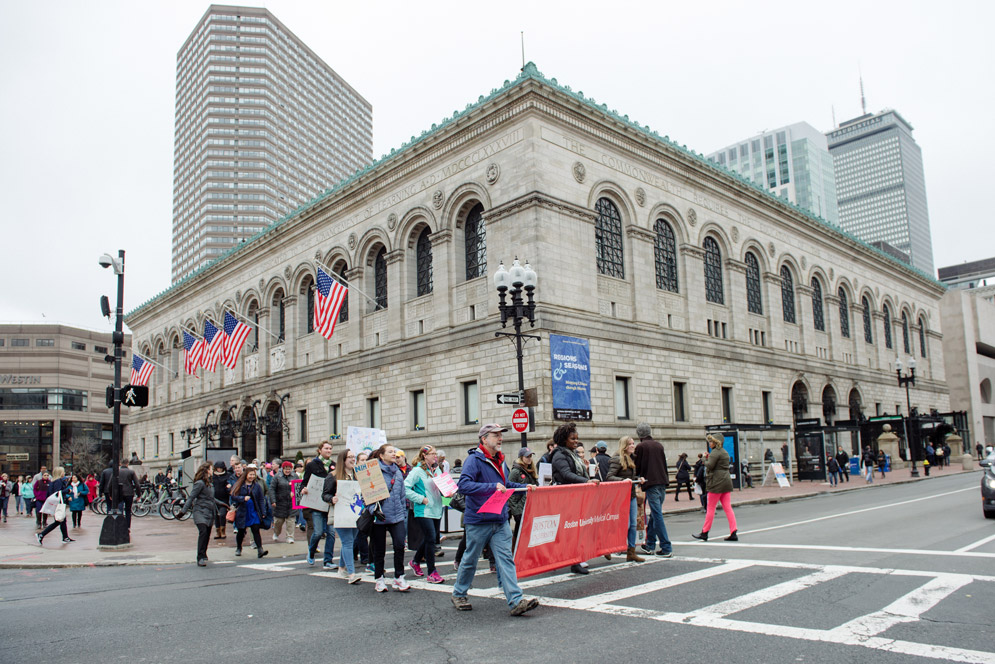On Saturday about 70,000 people gathered on the Boston Common for the March for Science, one of more than 600 held across the United States and around the world. Despite overcast and sometimes rainy skies and stubbornly chilly temperatures hovering in the mid-40s, scientists, engineers, and their allies filled the Common to protest proposed federal funding cuts, push for evidence-based policy, and advocate for diversity in science and engineering. Some came costumed as research subjects: bees or giraffes or wind turbines. One man dressed as the mishap-prone Muppet named Beaker. Many carried signs extolling the products of science—from antibiotics to cancer treatment to beer—and to a lesser extent, criticizing the Trump administration.
David Carballo, a College of Arts & Sciences professor of archaeology, attended the march with his wife, Jenny, also an archaeologist, and their two young sons. He split the difference between proscience and anti-Trump with a sign reading, “Be blinded by science, not by politics,” with images of English musician Thomas Dolby, known for the hit single “She Blinded Me with Science.” His eight-year-old son, Tony, held a sign that said, “Science is my future.” Carballo came to the march to show support for science and out of concern for his children’s future. “Denying climate change and undermining environmental stewardship will not make the world a better place for our kids,” he said.
Carballo was part of a broad BU contingent at the rally. One hour before the march, 120 Medical Campus affiliates—faculty, students, staff, and alumni—thronged around a crimson BU banner outside the Boston Public Library before weaving up Dartmouth Street and Commonwealth Avenue and through the Public Garden onto the Common.

Dylan Tam (CAS’17) (from left), Shannon Walsh (CAS’18), and Manike De Wet (CAS’17) walking down the Commonwealth Avenue Mall on their way to Boston Common. “When people watch the coverage of this march,” said Tam, “they’ll see people of all genders and ages and races—and see that scientists are real people.” Photo by Cydney Scott
“Last time I did this, it was impeaching Nixon,” mused Lee Wetzler, a School of Medicine professor of medicine and microbiology. What got his legs working again more than four decades later was not just the current president and his stance toward science, but the general anti-intellectualism he sees in the public square.
“The thing that bothers me the most,” Wetzler said as a band serenaded the crowd on the Common, “is that all of a sudden, being knowledgeable and understanding facts and basing what you do on facts has become abnormal.” Experts are derided as elites, he said, which strikes him as odd. “You go to a doctor not because they’re somebody you want to have a cup of coffee or a drink with,” he said. “You go to them because they know what they’re doing,” adding that “biomedical science has probably saved more lives than any travel ban.”
While march organizers had urged a proscience, nonpartisan message, some marchers didn’t hide their anger at the current president. “I’m Pissed That Natural Selection Gave Us Trump,” read the sign held by Kathleen Lacey (CAS’21), whose mother works at the School of Public Health.
Given some scientists’ concern that the march could come off as a partisan assault on the Republican White House and Congress, Lacey thought twice about her word choice, but opted to go ahead because she wanted her message to be “direct and to the point.”
MED postdoctoral fellow Annina DeLeo chose a more generic message for her sign—“Science, Not Silence”—with hand-drawn illustrations based on a childhood favorite, The Magic School Bus book series. (The sign depicted Miss Frizzle, the series’ magical and science-obsessed teacher, as the Statue of Liberty.) “I read those books over and over again as a kid; it’s a big part of why I’m a scientist,” DeLeo said.

Supporters of science filled Boston Common Saturday for the March for Science. Photo by Cydney Scott
For her, the march was personal. Trump has proposed a $6 billion cut in the $32 billion National Institutes of Health budget; the NIH supported DeLeo’s work as a graduate student at Columbia, and “if I want to go on in science and become a principal investigator, a lot of my funding would come through the NIH,” she said. Funding cuts could also discourage the next generation of scientists. “If the budget does get slashed…it’s going to be even harder for young minds to get involved in science.”
That fear haunts Linda Hyman, associate provost for MED’s Division of Graduate Medical Sciences and a MED professor of microbiology. Aspiring researchers will abandon, or avoid, science careers “if they sense the funding cuts limit opportunities for them in the future,” she said. “We can’t afford not to train the next generation of Nobel Prize winners.”
That message resonated with two of those future scientists, Sai Dadigala (ENG’20) and Ahsan Fuzail (ENG’20), both undergrad biomedical engineering majors. They were among about 150 Charles River Campus affiliates who rallied outside the Metcalf Science Center before the march. “This is what I’m going to do with my life, so it’s important to stand up for it,” said Dadigala, wearing a white lab coat stained from chemistry experiments. She said she didn’t think the march would further politicize science, but that “people have already politicized science by saying global warming doesn’t exist.”
Nearby Dadigala and Fuzail was Lauren Malsick (CAS’18), who is majoring in molecular biology and biochemistry. Malsick’s sign depicted a hand-drawn amino acid sequence spelling out the word “resist” (sort of). “I’m feeling very proudly nerdy,” she said of her handiwork. She found the Trump administration’s proposed funding cuts worrisome, she said, and was also concerned about the administration’s antiscience tenor. “I either want to go medical school or get a PhD in infectious disease. That’s difficult when people don’t believe in vaccines.”
Public health policy as well as science is under threat, said Lynese Wallace (CGS’09, SAR’11, SPH’17), a MED program administrator, who marched to protest Trump’s order banning federal money from groups that provide or promote abortion.
With a potential government shutdown looming Friday, Wallace said, the march would signal public opinion to Trump at an opportune time: “One thing that we do know about our president is that he pays attention to the news.…With sustained action in these marches, I think that in aggregate, they have an effect.”
For some, the march signaled a time of reckoning for science. With a self-critical eye, many speakers at the rally exhorted their colleagues to engage more with the public and welcome more diverse members to their ranks.

Alicia Wooten (MED’19) was a featured speaker at Saturday’s March for Science on the Boston Common. A PhD student studying the immune response to pneumococcus, Wooten is deaf, and she addressed the crowd in American Sign Language. “I didn’t need to hear a single thing to know that I could make a difference in science, despite others’ doubts,” she said. Photo by Cydney Scott
Alicia Wooten (MED’19), one of the march’s two featured speakers affiliated with BU, sounded this theme in her speech. “My name is Alicia Wooten and I’m a scientist. I’m also deaf,” she said, addressing the crowd in American Sign Language. “I’m standing here today for those who never dreamed that they could succeed because of who they are. For science to advance, we need you. It doesn’t matter what kind of disability you have. It is about what you can bring to the table.”
The other BU speaker, Graciela Mohamedi, a CAS adjunct lecturer in physics, spoke to the crowd in Spanish, then in English. She described how her intellectual curiosity propelled her to a career in science, and also recalled that as a postdoctoral fellow at BU, a man mistook her for a janitor and told her to clean the bathroom. “He heard me speaking in my mother’s tongue and decided I wasn’t a scientist, I was a janitor,” she said. “The racist and sexist prejudices within the sciences must be shattered. Scientists look like you and they look like me.”
Mohamedi urged the crowd to engage in the political process. “When this rally is over,” she said, “go home, call your elected officials, and tell them science matters.”
Saturday’s march was not the first excursion into activism for many of the marchers, but for others, it was their first public demonstration. Gregory Viglianti was among that group, and he said it was a step he took unhesitatingly.
The MED associate professor of microbiology and director of the Program in Biomedical Sciences said he recognizes science’s contributions when he types email on his computer or texts his wife on his cell phone. He attended the march, he said, because scientists have been remiss about explaining those benefits to nonscientists. “We have an obligation to explain to our fellow citizens why they should support our research through their tax dollars,” Viglianti said. “We need to do a better job of making the case that what we do is for the betterment of all people and the planet.”

















































Related Stories
Women’s March on Washington, Boston, around the World
BU women—and men—join in DC, Hub events
Hundreds Celebrate at SPH 40th Anniversary Gala
Honoring a “jewel in the crown of the University”
Advocating for Science on Capitol Hill
Grad students learn to lobby for policy, funding
Post Your Comment